Ukraine Shoots Down A Barrage Of Iranian Drones In Dawn Attack
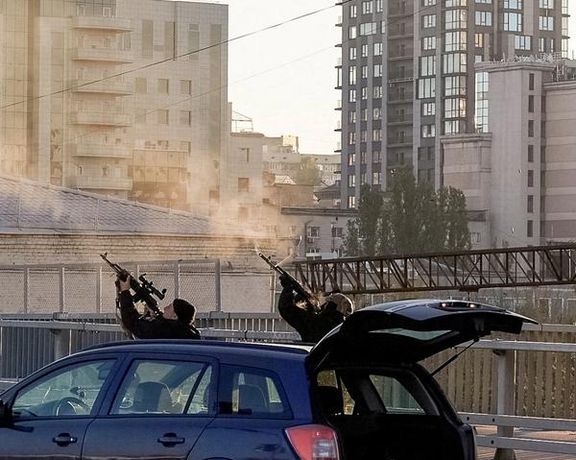
Russia launched 26 Iranian-made Shahed drones against Ukraine overnight Wednesday, but the Ukrainian air force said it downed 21 out of 26 suicide UAVs.

Russia launched 26 Iranian-made Shahed drones against Ukraine overnight Wednesday, but the Ukrainian air force said it downed 21 out of 26 suicide UAVs.
The drones were launched from Russian territory in the north and from the south on the eastern coast of the Azov Sea, Ukraine’s air force said.
Thirteen drones targeted Kyiv, but all were intercepted, the Kyiv City Military Administration said. Some wreckage fell on buildings and caused damage.
“Another massive drone attack on Kyiv,” Ukraine’s defense ministry tweeted. “It is obvious that the Russian military feels confident only when attacking peaceful cities.”
There is no reliable information where the five drones that evaded air defenses hit.
Russia has used hundreds of Iranian kamikaze drones since October to hit Ukrainian civilian infrastructure and to try to overwhelm air defenses during massive missile attacks.
The latest large-scale missile attack took place overnight on May 1, killing more than 30 civilians.
The United States and Europe have been supplying air defense weapons to Ukraine to prevent such Russian attacks and have sharply condemned Iranian supply of drones.
Iran first denied it had sent the weapons to Russia but in November Foreign Minister Hossein Amir-Abdollahian claimed the drones were shipped before the Russian invasion.
Ukraine has become more successful in shooting down the relatively slow flying Iranian drones. On December 5, the military said it had downed 60 of 70 Shahed drones, but it has been requesting more Western air defense systems.

Imprisoned human rights activist Narges Mohammadi accused the Islamic Republic of involvement in the poisoning of female students in Iran.
In a message after winning the UNESCO Prize for Freedom of the Press, Mohammadi said: "The regime pursues a policy that prevents girls from going to school by creating terror."
She further compared the Islamic Republic with the Taliban, stating that the Afghan militants "overtly" seek to deprive girls of the right to education, but the Islamic Republic pursues it "deceitfully".
The serial poisoning of students has been ongoing for over four months. The perpetrators have not been identified, while the attacks have spread to more and more cities.
Elsewhere in her remarks, Mohammadi urged foreign states to do more to topple the regime and liberate Iranian society.
"In adopting your policies, consider supporting civil society, the ones who take to the streets, and the political prisoners who are at risk of being executed. To advance the peaceful goals of the Iranian people, weaken the power of the regime to suppress, imprison, torture, and execute," she added.
UNESCO announced on Tuesday that Narges Mohammadi, Nilofar Hamedi and Elahe Mohammadi, three female journalists imprisoned in Iran, are the winners of this year's World Press Freedom Prize of this organization known as Guillermo Cano.
Founded in 1997, the Guillermo award is given each year to individuals or institutions that have contributed to press freedom in dangerous environments.
Earlier this year, the Swedish Olof Palme Foundation awarded its 2023 prize to three female activists, including Iran’s Narges Mohammadi, for their efforts in the fight for women's freedom.
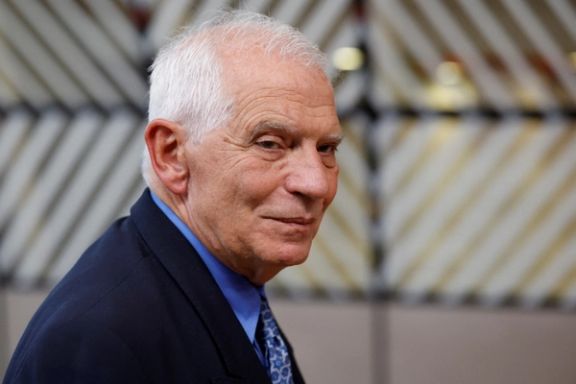
The European Union has slammed recent rocket and terrorist attacks against Israel, reiterating the country’s right to defend itself.
However, the EU’s Foreign Policy Chief, Josep Borrell, stressed that “any response must be proportionate and in line with international law”.
As Israeli Prime Minister Benjamin Netanyahu's government seeks to improve ties with the European body, Foreign Minister Eli Cohen met with Borrell in Brussels on Tuesday.
The EU’s Spanish diplomat urged Israel to refrain from “measures that could heighten the already high level of tension and jeopardize the very possibility of a future just and sustainable peace based on the two-state solution.”
During his visit, Cohen also discussed Iranian attempts to target Jews and Israelis on European soil with EU Parliament President Roberta Metsola.
According to the Times of Israel, they discussed the importance of the EU listing the Iranian Revolutionary Guard Corps as a terrorist group and banning all business with it.
In January, the European Parliament called on the 27-state body to list the Revolutionary Guards as a terrorist entity, blaming it for the repression of domestic protests and the supply of drones to Russia.
However, Borrell claimed the EU cannot list Iran's IRGC as a terrorist entity until a European court has determined that they are.
“European countries understand today more than ever the danger from Iran, and see eye-to-eye with Israel regarding the need to confront terror that comes from and is funded by the Iranian regime,” Cohen stated after the meeting with Metsola.
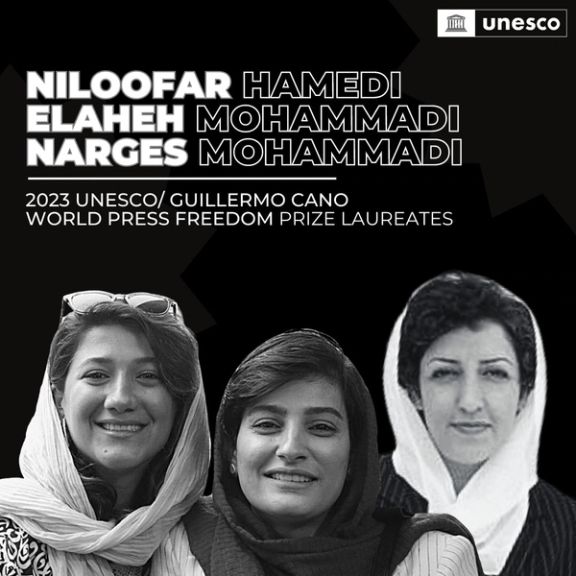
Three Iranian journalists currently behind bars have received the UN's most prestigious award for freedom of expression.
All three of them women and famous voices of Iran, have been awarded The 2023 UNESCO/Guillermo Cano World Press Freedom Prize.
Niloofar Hamedi, Elaheh Mohammadi, and Narges Mohammadi have become tools of the regime to suppress voices of dissent at a time when female journalists are increasingly under threat in Iran. It is believed around 70 journalists are currently behind bars, that number rocketing since the protests began in September.
Elaheh Mohammadi wrote about Mahsa Amini's funeral, and Hamedi broke the news that Amini died in morality police custody last September. Narges Mohammadi is renowned for her activism.
Amini’s death sparked months of protests in dozens of Iranian cities. This was one of the most significant threats to the Islamic Republic since the 2009 Green Movement rallies that drew millions of people to the streets.
“Now more than ever, it is important to pay tribute to all women journalists who are prevented from doing their jobs and who face threats and attacks on their personal safety,” said Audrey Azoulay, the UNESCO Director-General, on Tuesday during a ceremony in New York.
Zainab Salbi, the Jury Chair also said UNESCO is “committed to honoring the brave work of Iranian female journalists whose reporting led to a historical women-led revolution”.
The UNESCO/Guillermo Cano World Press Freedom Prize was established in 1997. Named after Colombian journalist Guillermo Cano Isaza, assassinated in front of his newspaper, El Espectador, in Bogotá, in 1986, it is given annually to individuals, organizations, or institutions that have made an outstanding contribution to press freedom in dangerous environments.
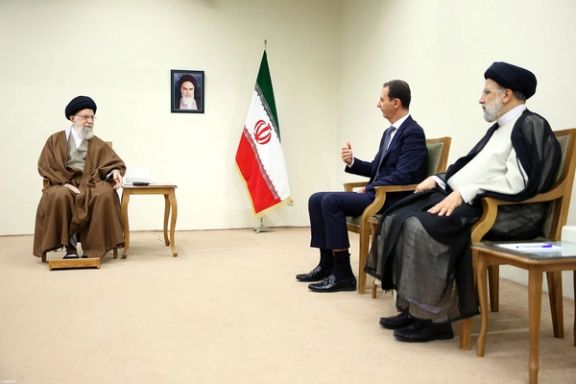
Media in Iran and the region have been speculating on the purpose and implications of President Ebrahim Raisi's two-day visit to Syria this week.
While media in Iran mainly dealt with Tehran's benefit from 12 years of fighting in Syria, reports from the region were mainly factual and often based on Iranian agencies' output.
Raisi's visit to Damascus is the first such visit by an Iranian President since the start of war in Syria 12 years ago.
Khabar Online quoting Israeli media said that Israel is worried about Raisi's visit to Syria. The website also quoted former diplomat and an Iranian expert on the Middle East Sabah Zanganeh, a political figure close to Supreme Leader Ali Khamenei, as saying that Iran has supported Syria's territorial integrity and Syrian people's security during the past 12 years.
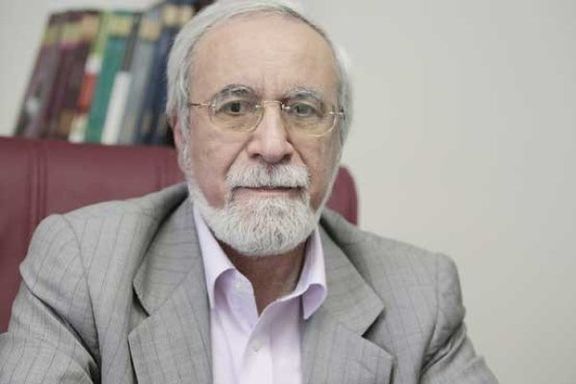
Iran intervened in Syria as soon unrest began in 2011 and reportedly played a major role in pushing the Assad regime to use overwhelming military force against the opposition.
Zanganeh reiterated Iranian regime’s rhetoric that insecurity in Syria can also affect Iran's security. Therefore, it is essential that the two countries' officials cooperate and coordinate their efforts about dealing with terrorism in the region which hinders trade with Iran via Syria's Mediterranean ports, a flimsy excuse given the fact that major ports remain under government control. Zanganeh's statement contradicted Iran's official claims about having ended terrorism in Syria.
Zanganeh generally described the purpose of Raisi's visit as discussing regional issues. Khabar Online noted that the foreign ministers of Egypt and Saudi Arabia have already visited Damascus, and Raisi's visit can facilitate talks between Damascus and Riyadh.
In a rather pessimistic report, Etemad Online quoted former senior diplomat Ebrahim Rahimpour as warning that Iran should stay alert to reap the benefits of its long and costly support for Assad’s regime. He also argued that Assad should visit Tehran to thank Iranian officials for their help and support which has led to his survival.
He pointed out that Assad's previous visit was done secretly and some Iranian officials including former Foreign Minister Javad Zarif were kept in the dark about his visit. This time he should visit Iran in the same manner he recently visited some Persian Gulf states.
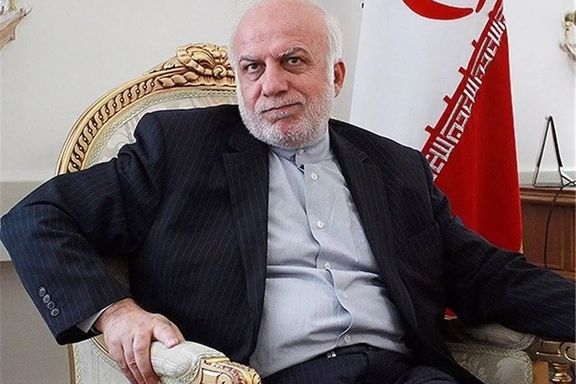
Rahimpour claimed that Iran has more influence than Russia in Syria. Meanwhile, he said that Iranian officials should not limit their foreign visits to a few countries. He was obviously mindless of the fact because of sanctions most Iranian officials cannot visit more than a handful of countries.
Rahimpour added that during Raisi's visit, Tehran should complain about Syria taking part in meetings with Russia and Turkey without Iran. He said ironically, “some of those we help, tend to forget us when their problems are solved.”
Among the media in the region, Al-Ahram's report in Egypt was totally based on the output of Iranian official news agency IRNA. The report called the visit "very important" without saying why. It also used Iran's rhetoric which called Raisi "Doctor Raisi."
Syria's official news agency SANA featured a very brief report with formulaic sentences such Raisi will be accompanied by " a high-ranking political and economic ministerial delegation," and that he will discuss with Assad "positive developments in the region."
London-based Asharq al-Awsat reported about Iran's plans to invest in the energy sector in Syria and quoted Arabic sources as saying that Syria is looking forward to an agreement with Iran in the areas of energy and electricity.
However, the fact is that Iran is in a financial crisis and unable to invest even in its own energy sector, starved of money and technology.
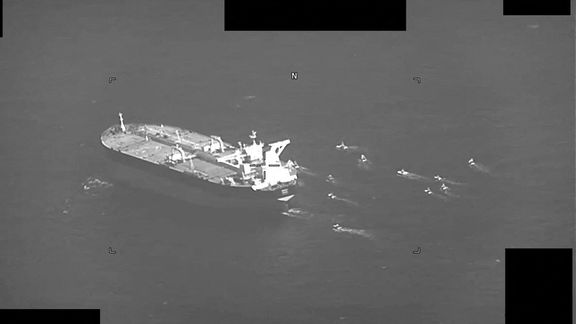
Iran has seized a second oil tanker in a week on Wednesday in Persian Gulf waters, the US Navy said, the latest escalation in a series of attacks on commercial vessels since 2019.
The Bahrain-based US Fifth Fleet said the Panama-flagged oil tanker Niovi was seized by Iran's Islamic Revolutionary Guard Corps Navy (IRGCN) at 6:20 a.m. (0220 GMT) while passing through the narrow Strait of Hormuz.
The incident comes after Iran on Thursday seized a Marshall Islands-flagged oil tanker in the Gulf of Oman called the Advantage Sweet. That tanker is being held by Iranian authorities in Bandar Abbas, the Marshall Islands flag registry said on Tuesday.
Maritime security firm Ambrey has said it believed the Advantage Sweet's seizure by Iran was in response to a recent seizure via a court order by the United States of an oil cargo aboard the Marshall Islands tanker Suez Rajan.
The Niovi oil tanker had been travelling from Dubai toward the UAE's Fujairah port when it was forced by IRGC boats to change course towards Iranian territorial waters, the Navy said.
The Niovi last reported its position at 0231 GMT on Wednesday off the coast of Oman in the Strait of Hormuz with Fujairah as its destination, Refinitiv ship tracking data showed.
According to the International Maritime Organization shipping database, the Niovi's owner is Grand Financing Co, and the ship is managed by Greece-based Smart Tankers.
"Heightened military activity and geopolitical tensions in these regions continue to pose serious threats to commercial vessels," the Marshall Islands flag registry said in an advisory on Tuesday.
"Associated with these threats is the potential for miscalculation or misidentification, which could lead to aggressive actions."
Since 2019, there have been a series of attacks on shipping in the strategic Persian Gulf waters at times of tension between the United States and Iran.
Indirect talks between Tehran and Washington to revive Iran's 2015 nuclear pact with world powers have stalled since September over a range of issues, including the Islamic Republic's violent crackdown on popular protests, Tehran's sale of drones to Russia and acceleration of its nuclear program.
Reporting by Reuters